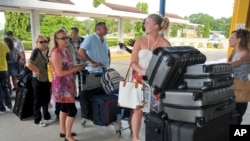The past several years have devastated Kenyan tourism, as bombings, kidnappings and political unrest have conspired to scare foreign holiday makers away.
But the Tourism Recovery Task Force is on a mission to boost one of the country’s most lucrative industries by convincing foreigners that Kenya is not as scary as it sounds.
Jake Grieves-Cook has spent most of his life in Kenya, and insists that his country is a wonderful place to visit.
“Our attractions are as great as they’ve ever been. Our wildlife is magnificent, our people are extremely friendly, we have wonderful beaches. The tourists who are coming here have had a great time," said Grieves-Cook.
But for several years now the problem has been that they are not coming, at least not in the numbers they used to. Grieves-Cook owns a safari company, and says that in the 42 years he has been working in Kenyan tourism, this is the most prolonged crisis he has ever seen.
The tourists who do come, he adds, often do so despite what they hear about Kenya in the news.
“The feedback we’ve received is that their families were very worried about them coming, people were concerned it was dangerous and unsafe, perhaps the couple who were going to travel with them didn’t come," said Grieves-Cook.
He says he and others in the industry are hiring fewer guides and temporarily closing down camps to cut costs. Some businesses have closed their doors altogether.
“The challenge for us is to communicate with the world. We need to wake up and actually let people know what it’s like here," he said.
Enter the Tourism Recovery Task Force, run by hotelier Lucy Karume. Its mission is to breathe life back into the flagging tourism industry, which, Karume says, accounts for nearly 12 percent of Kenya’s GDP. Tourism in Mombasa alone is down 60 percent this year.
Karume admits that recent events have not been kind to Kenya.
“Westgate happened, then terrorism happened, and it just came one after the other after the other. And now we have everybody wondering about Ebola, and Kenya has no Ebola," said Karume.
The taskforce is trying to convince the world that Kenya is not as scary as it sounds. Part of this involves working with Kenyan authorities to make sure security measures for tourists are in place. East African tourists are being encouraged to visit as well.
But much of Karume’s job is to lobby foreign tour companies and governments, urging them to take a closer look at Kenya and relax the travel advisories frightening tourists away.
This is a two-way conversation, she says.
“We’ve had one-on-one meetings with the British High Commission, the Americans, the French, the Australians," she said. "We even had a breakfast meeting with a team of EU and Europe ambassadors, and them telling us, ‘we need to see you people doing this, we need to see the presence of your policemen walking around.’”
Last month the task force scored a major victory, when the British government toned down its advisory against traveling in Kenya, declaring the national parks and most of Nairobi safe. Karume says this is just one sign that things could be looking up.
“Mombasa is still depressed. But we are seeing a turn. If they can tone down Mombasa, and maybe all the other advisories that have been given by the respective countries, then we know we have a chance to start recovering," she said.
A real recovery, she says, is not expected until the second half of next year, assuming the country remains calm.
But Grieves-Cook points out that for some of Kenya’s long-suffering businesses, it may already be too late.




